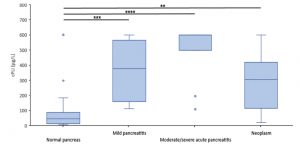
Back in April, our monthly newsletter highlighted the pitfalls of diagnosing pancreatitis in our pets.
Despite histopathology being the gold standard for a definitive diagnosis, this is infrequently performed, and a clinician must rely on a combination of clinical, imaging and laboratory findings, and in particular on cPLI. Canine pancreatic lipase immunoreactivity is deemed to have the highest sensitivity and specificity compared to other serological tests for detection of pancreatitis.
We are proud to communicate that last month LABOKLIN, our partner laboratory, has published a brand-new study on this topic on the prestigious Journal of Veterinary Internal Medicine. LABOKLIN has developed an in-house indirect sandwich ELISA assay for the quantification of cPLI in serum. The authors have studied the correlation of cPLI with histopathology results from normal pancreas, pancreatic tissue with mild inflammation, moderate/severe inflammation and, for the first time, also pancreatic neoplasia. In fact, both primary and metastatic pancreatic tumours are often cause of elevated cPLI levels, similarly to pancreatitis, and may represent a confounding factor in the diagnostic process.
The graphic below shows how the concentrations of cPLI in normal pancreatic tissue are significantly lower than in all the other disease categories.

Reference range is defined as normal for cPLI< 180 µg/L, questionable when cPLI 180-310 µg/L and consistent with pancreatic disease, in particular pancreatitis with cPLI > 310 µg/L.
Our cPLI assay has demonstrated a specificity of 92.5%, meaning that the rate of false positive results is extremely low. Sensitivity is also very high (90.9%) for diagnosing moderate and severe acute pancreatitis, slightly lower (75%) for mild pancreatitis, but still in line with previous publications.
cPLI concentrations in dogs with pancreatic neoplasms are more variable, ranging from decreased to elevated. These values are not statistically different from dogs with mild or moderate/severe acute pancreatitis. However, the study reports that 10 dogs out of 12 with pancreatic tumours have increased cPLI results. Therefore, an increased cPLI should raise the concern not only for pancreatitis, but also for the presence of a concurrent pancreatic neoplasia.
In summary, high cPLI results correlate very well with severe pancreatic disease, either inflammatory or neoplastic, representing a further diagnostic help for the clinician.
At BattLab, we offer a wide variety of laboratory tests for the diagnosis of pancreatitis, including cPLI. In the light of this study, cPLI reference ranges have been updated. For any query or information, do not hesitate to contact us.